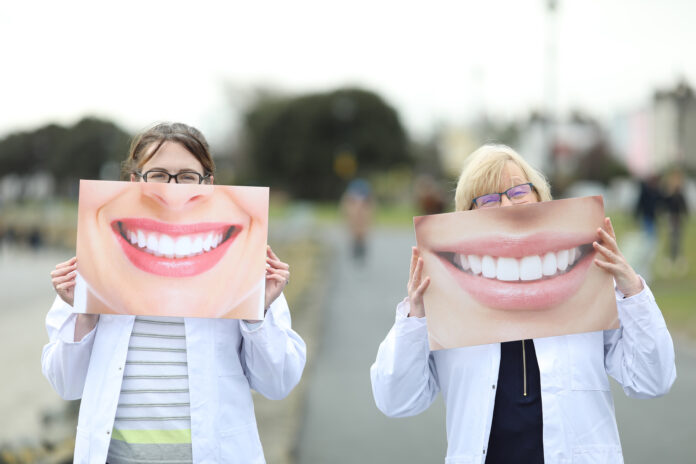
COVID-19 has impacted Irish people’s oral health, with pandemic-related stress causing one-fifth of people (20%) to devote less time to oral health.
The Wrigley Oral Healthcare Programme ‘Mind Your Mouth! survey, commissioned by Mars Wrigley in partnership with the Irish Dental Hygienists’ Association (IDHA), was published today to coincide with World Oral Health Day on March 20th.
The research of 1,000 people in Ireland across age, gender, region and socio-economic groupings, provided unique insights into the impact of Covid-19 on the nation’s oral health and oral health habits.
One-fifth of respondents (20%) said Covid-19-related stress meant they were brushing and flossing less, and almost one-third (30%) of those surveyed said they were experiencing teeth clenching and grinding since the pandemic began. Of those respondents who were grinding and clenching their teeth, 60% attributed these oral health problems to Covid-related stress.
Conversely, the Wrigley Mind Your Mouth! findings also show that 38% of people surveyed said that Covid-19 saw them change their oral health habits for the better, and that 15% of respondents are flossing more and almost one-quarter (23%) are brushing more.
Almost one-fifth of respondents (19%) said the reason that they changed their oral health habits was because they had more free time. This is especially true among younger people, with 33% of 18-24-year-olds and one-quarter (25%) of high earners saying they have more time.
The Wrigley Mind Your Mouth! survey also shows that more broadly, there are very high awareness levels across age groups on how to maintain good oral health – 76% of respondents said they are aware of the role that regular flossing and chewing sugar-free gum plays in supporting oral health.
Similarly, almost half (44%) agree that there is a link between chewing sugar-free gum and good oral health, and this connection is best understood among the younger age groups – 55% of 18-24-year-olds and 49% of 25-34-year-olds.
Commenting on the Mars Wrigley research findings, Dr Catherine Waldron, Postdoctoral Oral Health Researcher, said: “The fact that some people are spending more time brushing and flossing their teeth during Covid-19 is to be welcomed, as are the very high awareness levels of the benefits of brushing, flossing and chewing sugar-free gum to support good oral health.
“However, the Wrigley survey also shines a light on the impact of pandemic-related stress on our nation’s oral health. It is causing one-fifth of respondents to spend less time brushing and flossing and stress is also a major contributory factor in significant numbers of people who are grinding and clenching their teeth.
“The message is clear: even during the pandemic, people should visit their dental hygienist and in between appointments, brush floss and chew sugar-free gum regularly to maintain good oral health.”
Dr Mike Dodds, Principal Scientist, Oral Health Lead, Mars Wrigley, added: “Our research shows that Covid-19 has led to a significant increase in grinding and clenching in Ireland, and this trend is also evident in the US, with 70% of dentists saying that there has been an increase in patients presenting with bruxism since the pandemic began.
“Chewing sugar-free gum can provide a welcome distraction from unconscious tensing or grinding, and it also plays an important role in improving oral health while you can’t make it to the dental hygienist.
“It neutralises plaque acids through the stimulation of saliva, restores minerals in tooth enamel and inhibits the growth of certain bacteria on the tooth surface.” he added.
The Wrigley research also shows that the pandemic has affected visits to dental hygienists, with 55% of respondents saying that they have not had an appointment in the past year.
The Wrigley study also reveals a significant difference across demographics about visiting dental hygienists: 77% of 18-24-year-olds haven’t had an appointment in the past year, in contrast to the one-third (33%) of high earners who visited their hygienist within the past six months.
The majority of those surveyed (62%) said that concerns about contracting Covid-19 have caused them to delay appointments, rising to 75% of respondents in the over-55 age bracket.
Concern about contracting Covid-19 isn’t the only factor causing people to delay their visit to the dental hygienist: 32% of respondents said they had delayed due to a lack of available appointments, while 15% of respondents said their financial and work situation was the cause of the delay.
This factor rises significantly in the 35-44-year grouping, with one-quarter (25%) citing this as a reason for delaying visits.
Linda Phelan, President of the Irish Dental Hygienists’ Association (IDHA) said; “People should visit their dental hygienist regularly for a check-up and in between appointments, we recommend that they followed a balanced, comprehensive oral health programme that includes daily brushing and flossing, eating a healthy diet full of fruit, vegetables and dairy and chewing sugar-free gum for at least twenty minutes after eating and drinking.
“While concerns around contracting Covid-19 are entirely understandable, particularly among older age groups, it is also vitally important that people maintain good oral health throughout the pandemic. Our dental hygiene practises operate to the highest Covid safety standards, so please contact your dental hygienist to book an appointment today or log into www.idha.ie for more information.”










